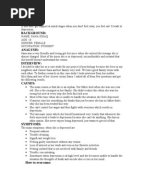The new Beck Youth Inventories-Second Edition for Children and Adolescents are designed for children and adolescents ages 7 through 18 years. The five inventories each contain 20 questions about thoughts, feelings, and behaviors associated with emotional and social impairment in youth. According to the World Health Organization, suicide is the second leading cause of death in 15-29-year-olds. The Beck Youth Inventories™ - Second Edition (BYI™-II) can be used as a group or individual screener to evaluate adolescents’ thoughts and behaviours relating to depression, anxiety, anger, self-concept, and disruption. Combination Inventory Booklets are $250 for 25 packages, with each of the individual Inventories costing $83 for 25 packages (Beck Youth Inventories- Second Edition, 2012) “Training required for verbal administration” (Measure Profile, 2012). Download BECK Youth Inventories of Emotional & Social Impairment: Depression Inventory for Youth, Anxiety Inventory for Youth, Anger Inventory for Youth, Disruptive Behavior Inventory for Youth, Self-concept Inventory for Youth: Manual, 319 When baby Bear is upset, Big Bear is always there to kiss it better.
Beck Youth Inventories Interpretation
| Title: | Beck Youth Inventories for Children and Adolescents- 2nd Edition |
| Author: | Beck, A., Beck, J., Jolly, J., & Steer, R. |
| Year: | 2005 |
| Description: | The Beck Youth Inventories 2nd Edition are five self-report scales that may be used separately or in combination to assess a child’s experience of depression, anxiety, anger, disruptive, behaviour, and self-concept. The inventories are intended for use with children and adolescents between the ages of 7 and 18. The BYI-2 provides easy to administer and brief (five to ten minutes each) assessments of distress in children and adolescents. Each inventory contains 20 statements about thoughts, feelings, or behaviors associated with emotional and social impairments in children and adolescents. Written at the second grade reading level, the items are easy to understand. For each scale, children describe how frequently each statement is true for them, including today. The inventories measure emotional and social impairment in the following domains: Beck Depression Inventory for Youth (BDI-Y); Beck Anxiety Inventory for Youth (BAI-Y); Beck Anger Inventory for Youth (BANI-Y); Beck Disruptive Behaviour Inventory for Youth (BDBI-Y); and Beck Self-Concept Inventory for Youth (BSCI-Y). |
| Age Range: | Children |
| Administration: | Individual and Group |
| Inventory: | 1 Complete Kit:
|
| Location: | |
| Notes: | |
| Publisher: | Pearson |
| Qualification Level: | Level B or 2 |
| Test Category: | Personality – Non-projective |
The Beck Youth Inventories—Second Edition for Children and Adolescents (BYI–II) are designed for children and adolescents ages 7 to 18 years.
Beck Depression Inventory Youth Free Pdf
Five self-report inventories can be used separately or in combination to assess a child’s experience of depression, anxiety, anger, disruptive behaviour, and self-concept.
Ease of use and flexibility of scoring allow for problem identification and prevention without extensive training. Results aid in the screening, planning, and monitoring of children and youth for educational placement and clinical treatment.

Benefits of the BYI–II
- Save time with brief screening tools
- Track students over time on the same group of integrated instruments
- Identify impaired children for referral to more extensive assessment services
- Identify potential vulnerability to bully/victimization
- Assess adolescents with special needs and low reading level
- Administer individually or in a group
- Compare BYI–II profiles of teens to BYI–II profiles of clinical diagnostic groups
- Examine the strength of the BYI–II Self-Concept measure relative to symptom strength in planning interventions
- Monitor progress
Content and Features
The five self-report inventories draw on the same principles as the widely-used Beck Depression Inventory®–II and other Beck Scales for Anxiety (BAI), Hopelessness (BHS), and Suicide Ideation (BSS).

Each inventory contains 20 questions about thoughts, feelings, and behaviours associated with emotional and social impairment in youth. The inventories are written at a second-grade reading level and may be read aloud to those with reading difficulties.
Flexible Administration
The BYI–II targets specific areas of treatment. Because the inventories are brief, children and adolescents are more likely to remain attentive and engaged while responding. The inventories can be completed prior to each clinical session, saving valuable treatment time.


The instruments measure a child’s or adolescent’s emotional and social impairment in five specific areas:
- Depression Inventory—in line with the depression criteria of the Diagnostic and Statistical Manual of Mental Health DisordersTM—Fourth Edition (DSM–IVTM), this inventory allows for early identification of symptoms of depression. It includes items related to a child’s or adolescent’s negative thoughts about self, life and the future, feelings of sadness and guilt, and sleep disturbance.
- Anxiety Inventory—reflects children’s and adolescents’ specific worries about school performance, the future, negative reactions of others, fears (including loss of control), and physiological symptoms associated with anxiety.
- Anger Inventory—evaluates a child’s or adolescent’s thoughts of being treated unfairly by others, feelings of anger and hatred.
- Disruptive Behaviour Inventory—identifies thoughts and behaviours associated with conduct disorder and oppositional-defiant behaviour.
- Self-Concept Inventory—taps cognitions of competence, potency, and positive self worth.
BYI–II Clinical Uses
- Clinical ranges for symptom severity
- Profile analysis for general understanding
- Items and item clusters as probes for deeper understanding
Norms
The inventories were developed and normed using standardization samples. T Scores allowing profile analysis to assist in conceptualizing how depression, anxiety, and anger may all be a part of the individual’s distress.

Using the BYI–II in Schools
- General screening
- Part of an initial eligibility determination
- Re-evaluations
- Progress monitoring of IEP goals
- Use the BYI–II with the Resiliency Scales for Children and Adolescents™ (RSCA)